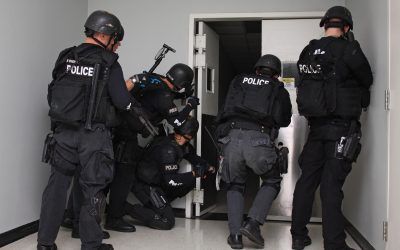OODA LOOP
One of the popular models in tactical decision making is the OODA loop, which stands for Observe, Orient, Decide, Act. A lot of people tend to over-simplify this concept. They view it as a linear cycle, or a checklist–as if you move from one step to the other. It is a lot more complicated than that. Our individual orientation–which is a product of our identity, training, experience, and our moral compass–drives each step of the process. It controls not only what we see, but where we look. It controls not only what we decide, but provides us with an index of solutions. It describes a two-way interaction with our environment, and shows us that our adversaries have an Orientation, too.
Teamwork
If you look around any professional workplace, you will see several types of leaders–by that I don’t just mean differing leadership styles, although that is part of it–I am talking about the types of leaders in a group who make the difference between a “loose gaggle” and a high-performance team. This discussion is going to focus on the informal leaders–the unappointed low- or middle-man who makes a difference. A new or inexperienced member of the group might be the type of person who owns their mistakes, never makes excuses, and humbly accepts criticism. You might be asking yourself, doesn’t that just make them a good follower?
Burning Alive
If you read some of the news articles about the recent apartment fire in London, you’ll see quite a bit of commentary about the panic encountered by people trapped on the upper floors of the building. Similar to the attacks on 9/11, people can be seen in YouTube videos jumping out of windows from heights that would seemingly guarantee their death.
Gun Handling
CAREFUL WITH THAT THING!There’s a video going around that shows a group of officers clearing a house, and on their way out of the house a dog escapes from its crate. As the officers are trying to get out of dodge, one of them ends up with a gun in his hand and cranks...
The X, Defined
FIGHT OFF THE X: Tactics for actions upon contact with a lethal threat in an ambush have remained relatively unchanged since I began my professional life in a world where something like that was a reality…
Balance: Training and Life
BALANCE: THE TOTAL PACKAGE We have a saying in dog training that you don’t fix one problem without potentially creating a new one. That saying is as true in dog training as it is in life. Many of us struggle to find harmony among both personal and professional...
Threat Assessment
THREAT ASSESSMENT; Threats of harm should always be taken seriously, but in many cases the person making the threat is only trying to exploit their victim or elicit a reaction for a perceived wrongdoing.
Two Types of Learners
TWO TYPES OF LEARNERS Psychologist Carol Dweck is known for her work on implicit theories of intelligence, which describe how an individual characterizes their own intelligence and learning ability. According to her work, people evaluate their own intelligence as...
Marker Training
Dog Training: Markers Maybe less tacti-cool than you’re used to, but enough people have dogs that you may find this useful. For more information, go to leerburg.com and read this: http://leerburg.com/markers.htm -Mike Marker training is an effective dog training...
Situational Leadership
SITUATIONAL LEADERSHIP This leadership model was created by a couple of psychologists named Hersey and Blanchard in the 1970s. The general premise is that the way you approach a person for a specific task depends on their level of competence for that task, and their...
Ask, Tell, Make: Still Works
ASK, TELL, MAKE: STILL WORKS In the police academy, we learned this decision-making algorithm for use of force: “Ask, Tell, Make.” First you ask ‘em, then you tell ‘em, then you make ‘em.” It was simple, but problematic. At face value, it became the law enforcement...
Remember Rick Rescorla
REMEMBER RICK RESCORLA For this week’s bulletin, I thought I’d share a Facebook post I wrote on Thanksgiving a few years ago. I hope you enjoy it. -Mike Today, and everyday, I am thankful for American heroes like Rick Rescorla. Rescorla was an Army lieutenant in...
Leadership in Teaching
LEADERSHIP IN TEACHING One of the first leadership opportunities I’ve had at any job has been some form of teaching, either in a formal setting like a classroom or one-on-one working with a new employee. I’ve also attended several formal instructor courses—and those...



